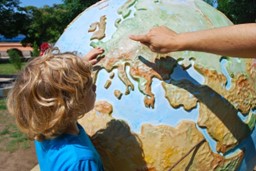By Dr Charles Margerison
Psychologist
How should we teach Geography in the 21st century?
That was the question I discussed with teachers, as a basis for developing an innovative new approach. Most teachers started with comments about their students; – “In most of my classes, at least a third of the students were born in foreign countries. Therefore, their understanding of social geography relates to their family in different places around the world, their language, their religion and their way of life.”

Another comment was based on holiday and family visits; “I asked my students how many of them had visited another country. I discovered that about half had done so, which gave them a personal experience of the geography, the people and the places.”
Also, a teacher commented on the location of the school when making an interesting observation; “The area in which our school is based has a multi-ethnic population, so students are used to sharing stories about their families and the countries from which they come.”
This led me to the view that rather than just following a standard curriculum, students can learn about countries and cultures in different ways. To support that, I developed the Can Do Kids Band.
 It is a virtual group of five teenagers who students can follow on their music tours. The band members come from India, South Africa, Australia, China and the USA. They exhibit a ‘can do spirit and attitude’ that is reflected in the name of their music group.
It is a virtual group of five teenagers who students can follow on their music tours. The band members come from India, South Africa, Australia, China and the USA. They exhibit a ‘can do spirit and attitude’ that is reflected in the name of their music group.
Students find it engaging to learn by discussing the different experiences that the band encounter on their travels. From the dancing and music, to the climate and sights to be seen – there is much to digest and talk about.
Some students develop abilities to play an instrument or sing, or discover a famous landmark, or explore new types of food to enjoy. In this digital age, students find it easy to identify with and learn from this virtual band. The experience allows them to immerse themselves in the cultures, cuisines, music and environment of the various countries visited and explored.
The virtual story of the Can Do Kids Band is comparable to how many pop groups started out, initially meeting as a group of friends. In this case, a business benefactor acts as the manager of the band and sponsors their visits to various countries. As a result, they learn about different ways of life by following the music and experiencing the cultures of the people they meet on visits to France, Australia, Mexico, Egypt, India, China, Brazil, the USA and many more.
They are called the Can Do Kids because they have a positive approach. They exemplify the ‘can do spirit’ and learning by exploring. The band members believe they can achieve a lot, while having fun as they work together as a team.
In the research discussions, educators and students found the idea of learning with and from a virtual band interesting. As one said, “it seems an innovative way of engaging students.” In particular, they wanted to know how to make the lessons interactive, rather than just another computer-based activity.
During the pilot trials, a process emerged that has proven valuable, as it involves students learning via group debates and presentations. Each lesson is based on a five-minute video in which the virtual Can Do Kids Band explore a country.
After watching the video, students meet in groups of between 3 and 6 students, depending on the number in the class, to develop their views and make presentations. This enables students to develop their oracy and conversation skills
The following is an example of a lesson plan to cover between 45 and 55 minutes. It is important to keep to the allocated times to enable the students to have enough time for discussions and presentations.
A – Introduction – 5 minutes – Educator indicates that the lesson will focus on the country and culture of France, with a short video being shown to facilitate group discussion. Prior to the video being shown, students are organized into small groups. They are told to make notes during the video as a basis for discussion, as each group will be asked to make a presentation.
B – Video – 5 minutes – The video is shown to the class.
C – Discussions – 15 minutes – Students meet in their assigned groups. They can be asked to appoint a note taker and presenter. The topic for discussion can be either of the following –
D – Presentations – 10-15 minutes – Each group makes its presentations.
E – Summary – 10-15 minutes – The educator reviews the presentations, and adds any further information, plus assigns project work as required.
It is useful to ask students to give feedback on the learning points they gained. This can be done by asking them to write key words to describe their experience during the lesson. Examples of words they use may be – ‘enjoyable’ – ‘interesting’ – ‘valuable.’

The important point is to ask the students ‘why they used those words?’ That will spark an insight into their experience and learning. Even if the students use words like ‘confusing’ or ‘unclear,’ it is important to ask them what they mean. Their insights can help improve the next lesson.
Even if formal project work is not required, it is valuable to suggest ways in which students can add to their learning. Examples include –
The process of helping students discover the wider world beyond their classroom and hometown is important. The Can Do Kids Band is a virtual music group that enables Primary level students do that. Their motto is ‘follow the music and learn about people and places.’ To visit the website, click image:
An Educator’s Handbook is also available. It outlines the interactive process of learning knowledge and skills through group discussion. Through proactive participation, students develop their interpersonal communication skills as well as their understanding of geography, the environment, the customs and cultures of people and places visited.

Dr Charles Margerison, President and founder of Amazing People Worldwide, is a Psychologist. He is also President of Amazing People Schools. Dr Margerison has consulted widely for major organizations in the fields of organizational and educational psychology. He was previously Professor of Management at Cranfield University, UK, and the University of Queensland, Australia. He founded Amazing People Worldwide in 2006 and is supported by a dedicated global team. He previously co-founded Emerald Publications, and Team Management Systems and has authored more than 30 books. Dr Charles is also the creator of ‘Can Do Kids Worldwide, a virtual music group that helps students to learn about countries and cultures through music. He has also developed Imagineland, for early learners. You can follow him on Linked in .
For more information, please email info@amazingpeopleworldwide.com
Websites:



Copyright © 2021. Amazing People Worldwide.
All Rights Reserved.
This site is protected by reCAPTCHA and the Google
Privacy Policy and Terms of Service apply.



